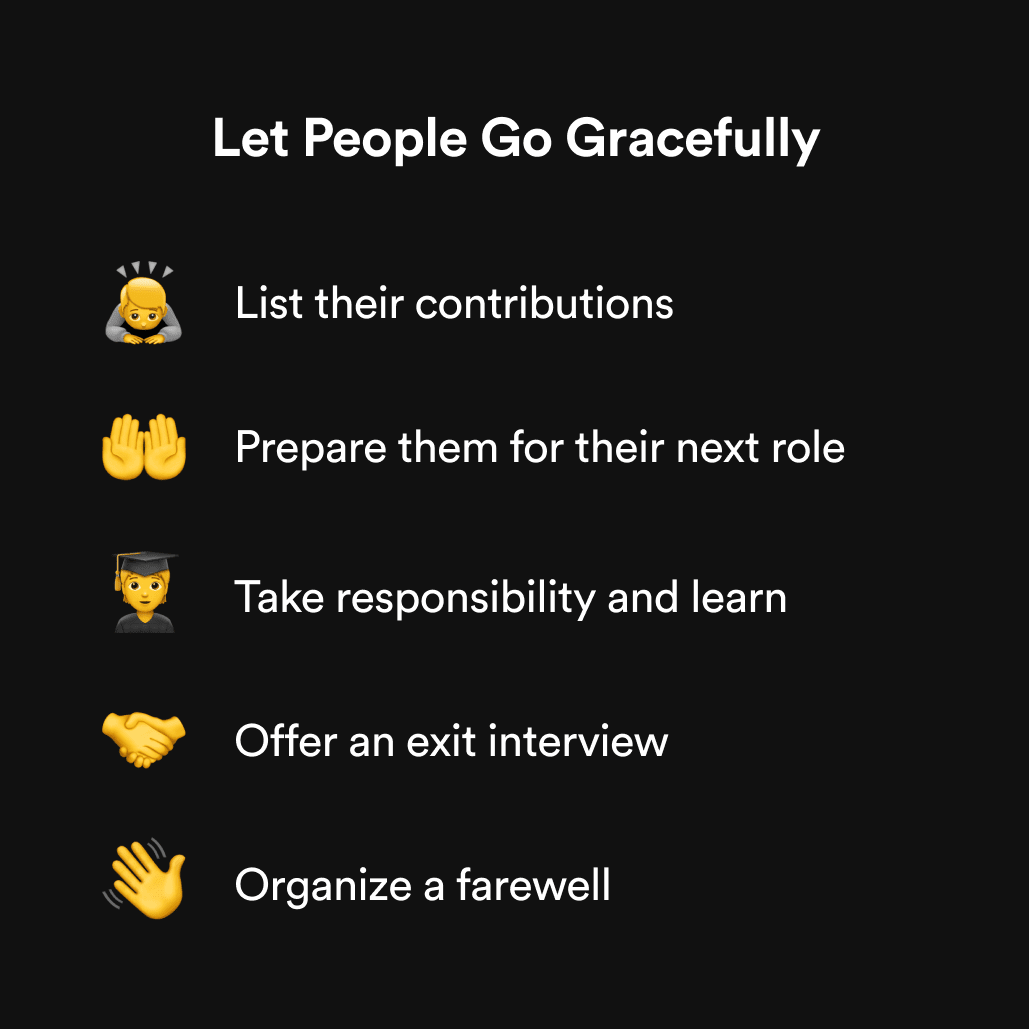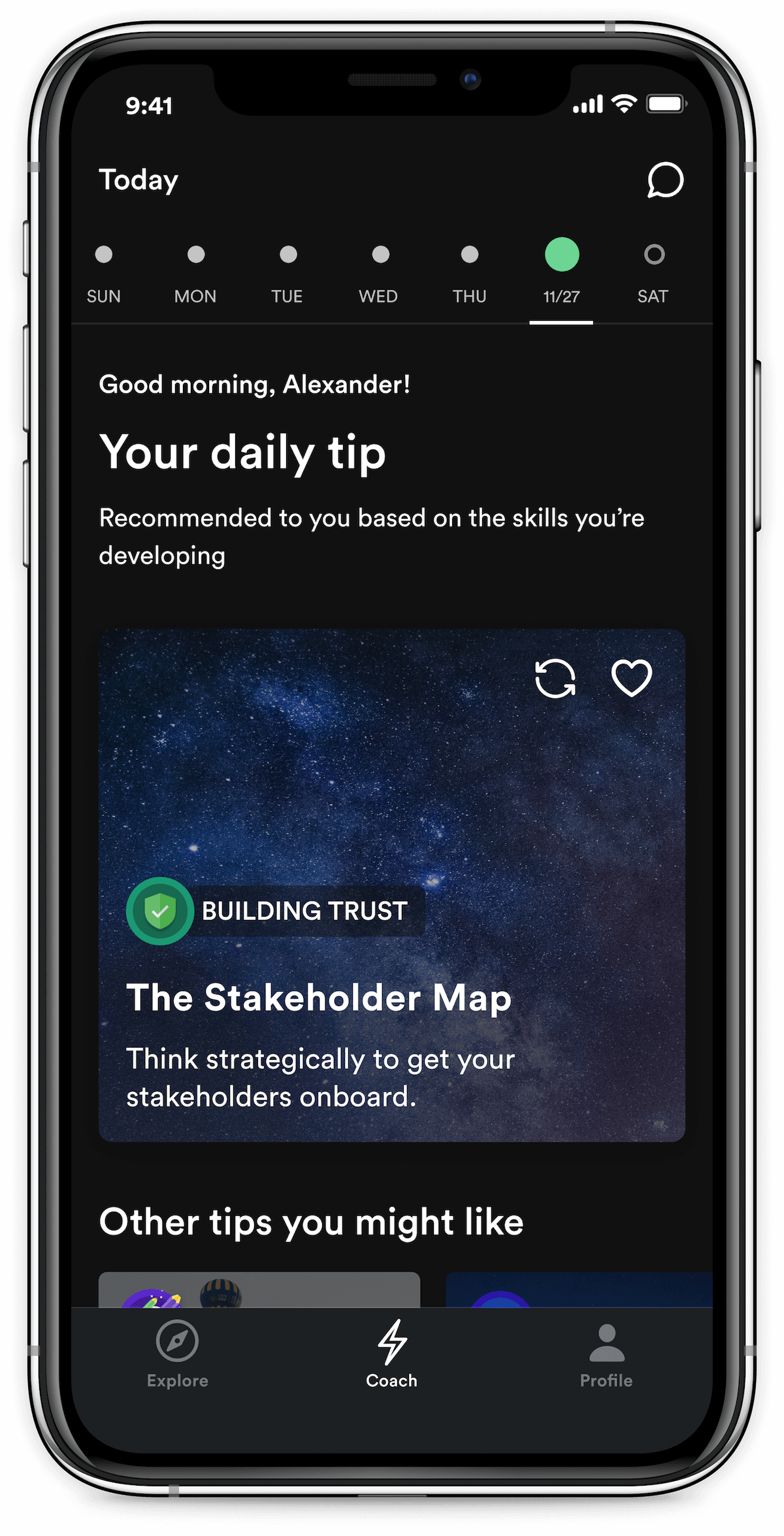Let People Go Gracefully
Follow this guide to part ways compassionately.

Inspired by:
Rebecca M. Knight, Writer for Harvard Business Review & Financial Times

Let People Go Gracefully
So you've decided to part ways with one of your team members. You've covered the bases with your leadership team and HR (if you have them). Now it's time to have the conversation.
How ‘graceful’ this experience is will come down to your ability to deliver an honest decision and make them feel like their work had meaning.
Here's some guidelines so you can deliver the news with more confidence and compassion.
🙇♂️ 1. List their contributions
Start with the right intention by making a list of their achievements and the impact they had on your work and culture:
• What were their top wins? • What did the team appreciate about them along the way? • What impact did they have on others? • What do you want to thank them for?
This gives them a chance to reflect on what they did well and how they can have the same, if not greater impact in their next role.
✍️ 2. Draft your core message upfront
This will be what you say first when you're face to face delivering the news. Make it clear, logical, and grounded. They should understand that this is a professional decision.
Write down the key points:
- What decision was made?
- How did you arrive at the decision? (more on this later)
- When does it take effect?
- What will happen to the work they were responsible for?
🤲 3. Prepare them for their next role
You want them to feel proud of their time, not bitter. So show them respect, no matter how it ended.
In preparation for the conversation: • Do your research and invest in a fair severance package • Draft your reference for their next role • Write a list of contacts who can help them land their next opportunity
💬 4. Break the news
You've done your preparation, now it's time for the conversation.
Let your team member know you need to have an important talk with them. Set up a meeting, and then once you've checked in, break the news.
Remember the key points: • Don't wait, and start with the decision • Give the context • List their contributions
After you've told the person affected, communicate your decision to the rest of the team as soon as possible.
This helps to avoid unnecessary tension, gossip, or speculation about what happened.
🧑🎓 5. Take responsibility and learn
When you let go of a team member, you need to acknowledge the company’s role in it:
• You changed strategy and their role became less relevant • You couldn't give the support they needed • You couldn't match their career ambitions
Accepting responsibility for these shortcomings instead of blaming the employee shows humility and builds trust with your team.
To go one step further, demonstrate your promise to learn from the situation: "As you can imagine, I feel badly about this decision. Here’s what I learned...we need to do this differently..."
🤝 6. Offer an exit interview
Regardless of the situation, people want to feel heard. This is one of the last interactions they'll have with your company, so make it a priority and come prepared.
Meet with the outgoing team member before their last day to get feedback on their experience with the company, their role, and the decision.
A few questions you can ask are: • How do you feel you were managed? • Were your goals and objectives clear? • Do you feel like you were able to perform?
Important: Remember to respect their decision if they simply want to move on.
👋 7. Organize a farewell
Give them options - they might want to have a group call, or follow-up individually. Most importantly, give them the chance to say goodbye.
Make your last impression a good one by treating them with respect and showing how much you value their contribution to the company.
Then after all is said and done, return to your team. They will probably feel down and it’s very normal. Give them a few days to process the news, and offer individual calls to talk it through.

Become a world-class leader in two minutes a day